Engaging Caregivers as Allies in Adolescents’ Health and Wellbeing
by Edton Babu Ndyabahika, Youth Sector Head, WEI/Bantwana, Uganda.
As I write this blog about the importance of engaging caregivers as allies in maintaining the health and wellbeing of their adolescent children, I can’t help but think about my own family. I am the proud father of four children, two of whom are adolescent girls. I think about the unique ways they navigate everyday challenges — and about the energy and flexibility required of me as a parent to nurture their best instincts and support their growing autonomy. I know that my consistent love and support is fundamental to their healthy growth and development. When I stumble as a parent, I am comforted by wise counsel from my family and community networks.
However, for many parents/caregivers in Uganda, raising children is a daily struggle. Poverty, food insecurity, unequal social norms, and the high prevalence of HIV and gender-based violence (GBV) impede family resilience, particularly for the nation’s 8 million vulnerable children, including an estimated 95,000 living with HIV.
It is through this parental lens that I write about Peer Support Groups Plus — a family-based approach to improving treatment adherence and resilience of vulnerable adolescents living with HIV (ALHIV) featured in a poster presentation at the 2020 Virtual AIDS conference (PED0827) and illustrated in this powerful video. Peer Support Groups Plus is an initiative of the USAID/Better Outcomes for Children and Youth (BOCY) program in Uganda, implemented by the Bantwana Initiative of World Education, Inc. (WEI/Bantwana) and five local partner organizations.
Worldwide, advances in HIV treatment have reduced the number of people dying from AIDS-related illnesses in all age groups except one: adolescents between the ages of 10-19. In Uganda, at 70%, viral suppression is lowest among young people under 20 years of age, compared to 90% of adults over 25 (Uganda COP 2019). ALHIV in our BOCY program reported a lack of caregiver support — poor understanding of medication schedules, weak appreciation of the importance of adherence, minimal emotional support — as a primary contributor to low adherence, viral load suppression, and retention in care.
In response, WEI/Bantwana designed an intervention built around BOCY-supported Peer Support Groups Plus, which help adolescents living with HIV to improve coping skills. We surveyed caregivers and adolescents to determine key challenges and needs. With health counterparts, we designed a responsive package to address financial, parenting, and health concerns and layered the package on Peer Support Groups delivered during adolescent ART days or on weekends, to accommodate adolescents in school.
The Peer Support Group Plus intervention brought caregivers and adolescents together for joint learning. Community-led financial supports including savings groups, alternative skills development*, backyard gardening, entrepreneurship, and financial literacy training motivated greater caregiver participation in parenting and treatment literacy sessions. Sessions were delivered by clinic and community staff, often in tandem, leveraging their respective expertise while promoting cross-learning and coordination. Health workers clarified treatment and medication questions and explained the importance of adherence and viral load testing, while trained community structures delivered parenting sessions that strengthened communication skills and supported caregivers to help their children navigate emotional challenges, including HIV and GBV risks, associated with adolescence. We also brought together clinic, school, and child-protection service providers to identify actions to improve coordinated support for ALHIV, including addressing disclosure, confidentiality, and stigma. As one adolescent remarked:
I missed my appointments for two months while at school because I had not disclosed [my HIV status] to any teachers or administrators. This made me miss out on my refills. After my mother and I were taken through the importance of adherence and how to disclose, we opened up to the matron and the head teacher. Since then I have never had any challenge getting permissions to go for my refills. They even remind me! Indeed, they have become my treatment supporters!
The results from the Peer Support Group Plus intervention are encouraging.
- Nearly half the participating adolescents reported improved levels of care—including support for disclosure and accompanying of children on ART refill days
- Caregivers’ and adolescents’ improved appreciation of the importance of adherence led to increased disclosure and viral load suppression.
- Improved communication strengthened family bonding, reduced tensions at home, and bolstered caregivers’ overall support for their children.
For more detail on the model and our results, please see this Technical Brief.
As a parent and a development practitioner, the need for caregiver engagement is self-evident: Our children sit at the center of our families, but there is no road map for raising them. Our Peer Support Group Plus experience suggests that — given the right tools, skills, and supports — caregivers can be powerful allies in supporting adherence and resilience among children and adolescents living with HIV. Scaling up such holistic family-based approaches is essential to sustain and advance gains. With COVID-19 causing disruptions to ALHIV care and treatment, we must continue to rapidly adapt clinical, psychosocial, and socioeconomic models that impact disclosure, adherence, viral load suppression, and resilience. Our children deserve nothing less.
* Alternative skills is a one-day, low-cost skills training model requiring only locally available materials (that families can use to immediately generate income to help with basic needs. Examples include chapatti baking, soap-making, biscuits, etc.”

